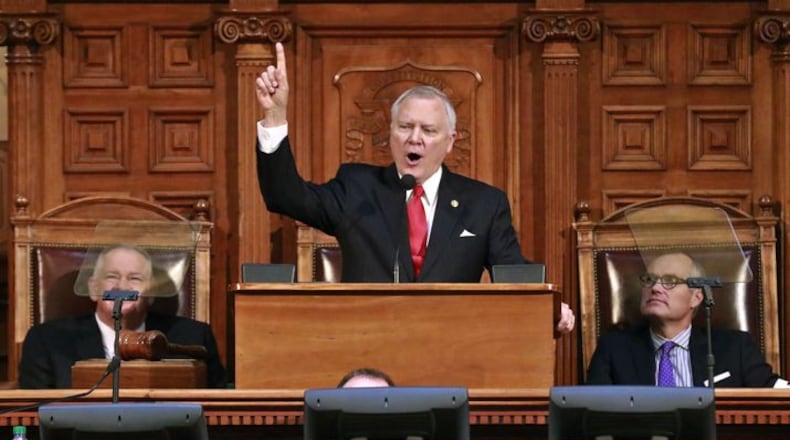Stressing he will "accentuate the positive" in his final years in office, Gov. Nathan Deal on Wednesday called for a new effort to help persistently struggling schools and cautioned lawmakers to take a wait-and-see approach before making vast changes to healthcare policy during his State of the State address.
Below is a look at the policy highlights of his speech. (You can find the budget highlights, including a 2 percent teacher pay raise, here.)
Education: The governor plans to put the full weight of his office behind a measure that would give the state more power to intervene in persistently struggling schools, even after voters resoundingly defeated a constitutional amendment that would have given his office the authority to do that.
He said his proposal, which has yet to emerge, would focus on elementary schools.
“It should be abundantly clear to everyone, including those in the education community who so staunchly support the status quo, that this is unacceptable,” said Deal. “If this pattern of escalation in the number of failing schools does not change, its devastating effects on our state will grow with each passing school year.”
Health policy: Deal urged lawmakers to take a wait-and-see approach over how the new administration will tackle the Affordable Care Act before taking action.
“I want to take a moment to caution against taking giant leaps on healthcare policy until we know what Congress and the incoming administration will do,” he said, adding: “Hopefully very soon, the authority to make decisions regarding our state Medicaid program and how to design it in such a way that best fits the needs of our citizens will be returned to Georgia.”
Cyber-Security: The governor unveiled plans for a $50 million state-owned training center that's designed to teach students and educators how to combat hacking and other forms of cyberwarfare, an announcement that comes as the U.S. intensifies its efforts to bolster the security of the nation's computer systems.
“Finally, we will create a cybercrime lab run by GBI as we work with all state agencies and local governments to ensure that our citizens, employers and their digital information are protected,” he added.
Bed tax: Deal called for the swift passage of the extension of a hospital fee designed to leverage more federal Medicaid. Not doing so, he warned, could leave a gaping $600 million-plus hole in the state's healthcare budget.
Autism coverage : Deal wants to expand Medicaid and State Health Benefit coverage for treatment of autistic Georgians who are under the age of 21. He called it "a deliberate and meaningful approach to this matter that touches so many hearts."
Opioid addiction: The governor wants lawmakers to codify an executive order that allows pharmacists to dispense naloxone, an emergency drug used to reverse opioid overdoses, over-the-counter across the state.
What was not mentioned: Deal made no reference to some of the state's most divisive social issues, including gun rights expansions, abortion restrictions or the "religious liberty" fight.
He's hardly mentioned the "religious liberty" debate since his veto of the controversial legislation in March, though he's maintained that his opposition hasn't changed. This time, Lt. Gov. Casey Cagle and House Speaker David Ralston seem on the same page. Read more here.
He hasn't closed the door on another divisive proposal he vetoed last year: campus carry legislation that would allow college students to carry concealed guns onto campuses. That veto came only after lawmakers defied his personal request for exceptions, and Deal sounded receptive – as long as it included some of the changes he wanted. Read more here.
About the Author


